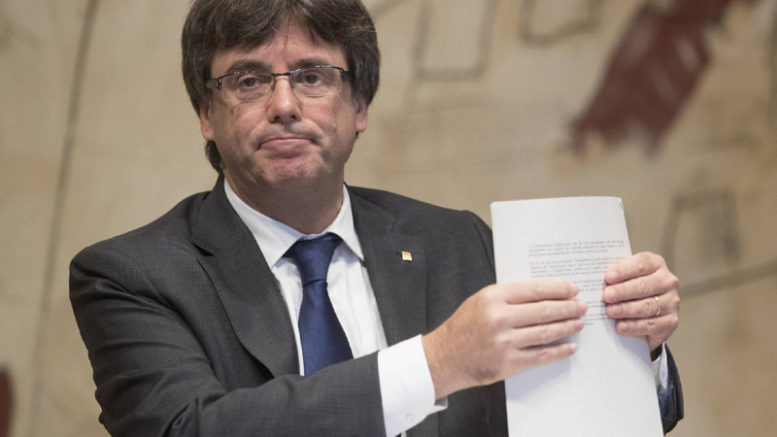In the morass of charges and counter-charges flying over the push toward secession from Spain being fomented by the leadership of the Catalan regional government in northeast Spain, the truth over what is actually occurring on the ground and the recent history of what led up to current events is often obscured, if not downright buried within the flood of information and misinformation inundating media coverage of the conflict.
On Wednesday, Spanish police acting on the orders of a Barcelona-based judge searched 41 separate locations, impounding nearly 10 million ballots and other materials related to Catalonia’s planned 1st October referendum on independence from Spain that earlier this month was declared unconstitutional by the country’s Tribuna Constitucional (Constitutional Court). In the process, police also detained 14 second-tier officials of the Catalan regional government on a variety of specific related charges, each of whom has been brought before a judge in Catalonia and all at least seven of whom have already been released on their own cognizance pending a further arraignment hearing.
In a late-night press conference Wednesday and again Thursday morning in a guest-opinion piece in the pages of The Guardian newspaper in London titled Spain’s attempt to block Catalonia’s referendum is a violation of our basic rights, Catalan regional president Carles Puigdemont responded with serious charges: “European values, civil rights, freedom of speech, freedom of information and freedom of assembly are being violated by Spain’s central government, which has sent the police to search newspapers, printing companies and private mail services; ban political meetings; seize referendum material; and threaten to imprison democratically elected politicians.”
► ► Read Carles Puigdemont’s opinion piece in the Guardian, here …
Meanwhile on Thursday morning, Spain’s national daily newspaper El País responded to Puigdemont’s charges made the night before with editorial leaders in both its Spanish edition (Las mentiras de Puigdemont) and the paper’s English edition (The lies of the Catalan regional premier).
► ► Read the El País editorial article in English, here …
In its rebuttal, El País called out Puigdemont for making charges that it says are false and which the paper’s editorial leader picked apart point-by-point, among them that: “The government of the Generalitat has today been the target of a coordinated aggression by the Interior Ministry’s police forces”; the goal of the operation was to “suspend the activities of the (Catalan) government,” a government that holds “democratic legitimacy”; “This aggression lacks legal backing,” it “violates the rule of law” and the European Charter of Rights, and is “a de facto suspension of self-government and a de facto application of a state of exception”; that various acts including “indiscriminate raids, even inside private homes” and other measures such as “the closure and blocking of websites” represent “an assault on democracy”; that “We citizens have been called to the polls on October 1 to defend democracy in the face of a repressive and intimidating regime”; and that “We [Catalan leaders] are defending the right of Catalans to freely decide their future”. Again, according to El País, these and other charges being made by Puigdemont and the Catalan pro-independence leadership are patently false.
As tension builds in the approach toward the decisive 1st October referendum date, followers of Progressive Spain are invited to read for themselves both Puigdemont’s opinion piece in The Guardian and the El País editorial rebuttal to his charges and draw their own conclusions about “Truth vs post-Truth” in the conflict over Catalonia’s still-scheduled 1st October referendum on independence and on the likelihood, or not, of the region’s secession from Spain.
► Read the Carles Puigdemont opinion piece in the Guardian, here …
► Read the full El País editorial leader in English, here …
► Read the full El País editorial leader in Spanish, here …


